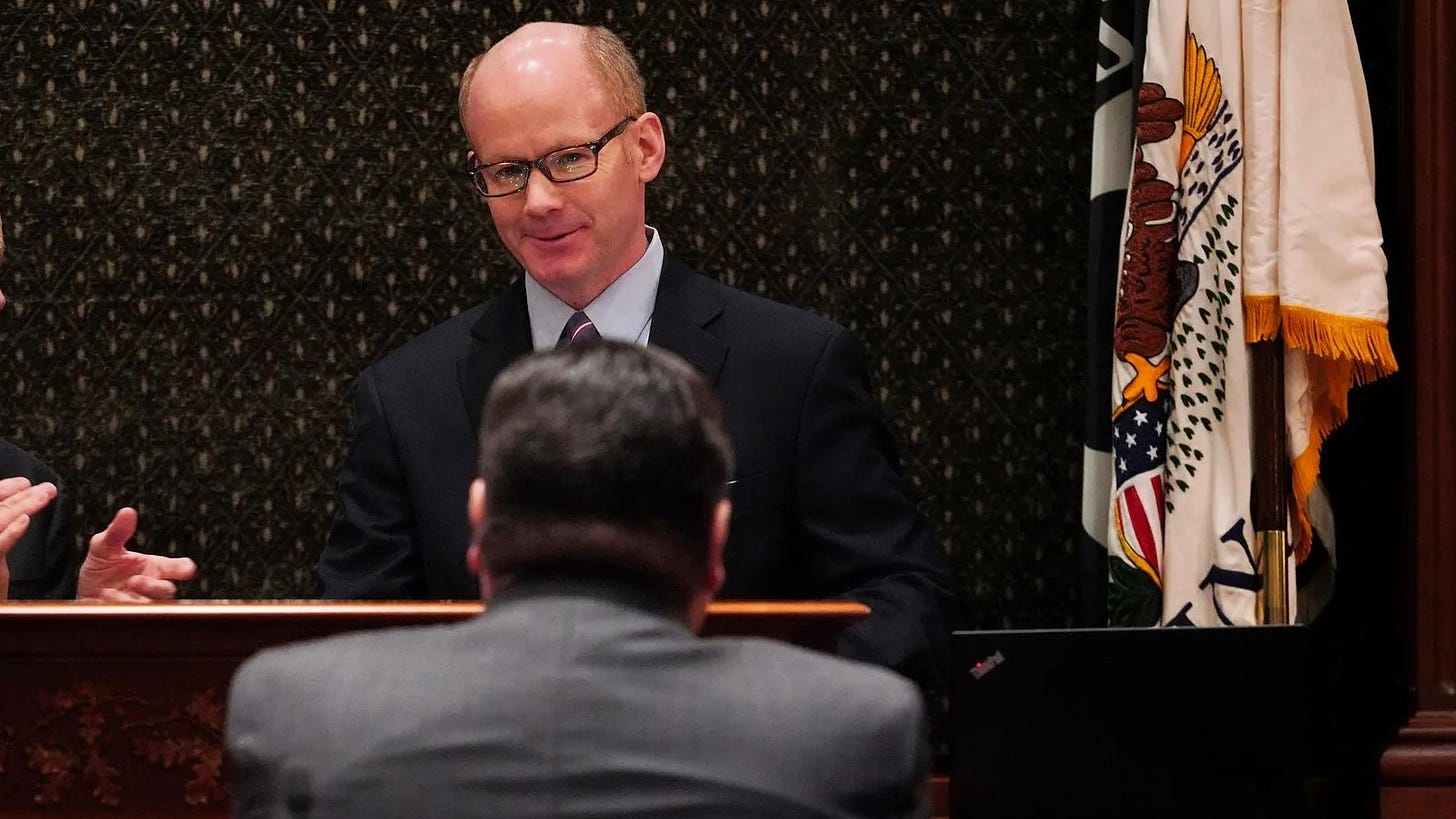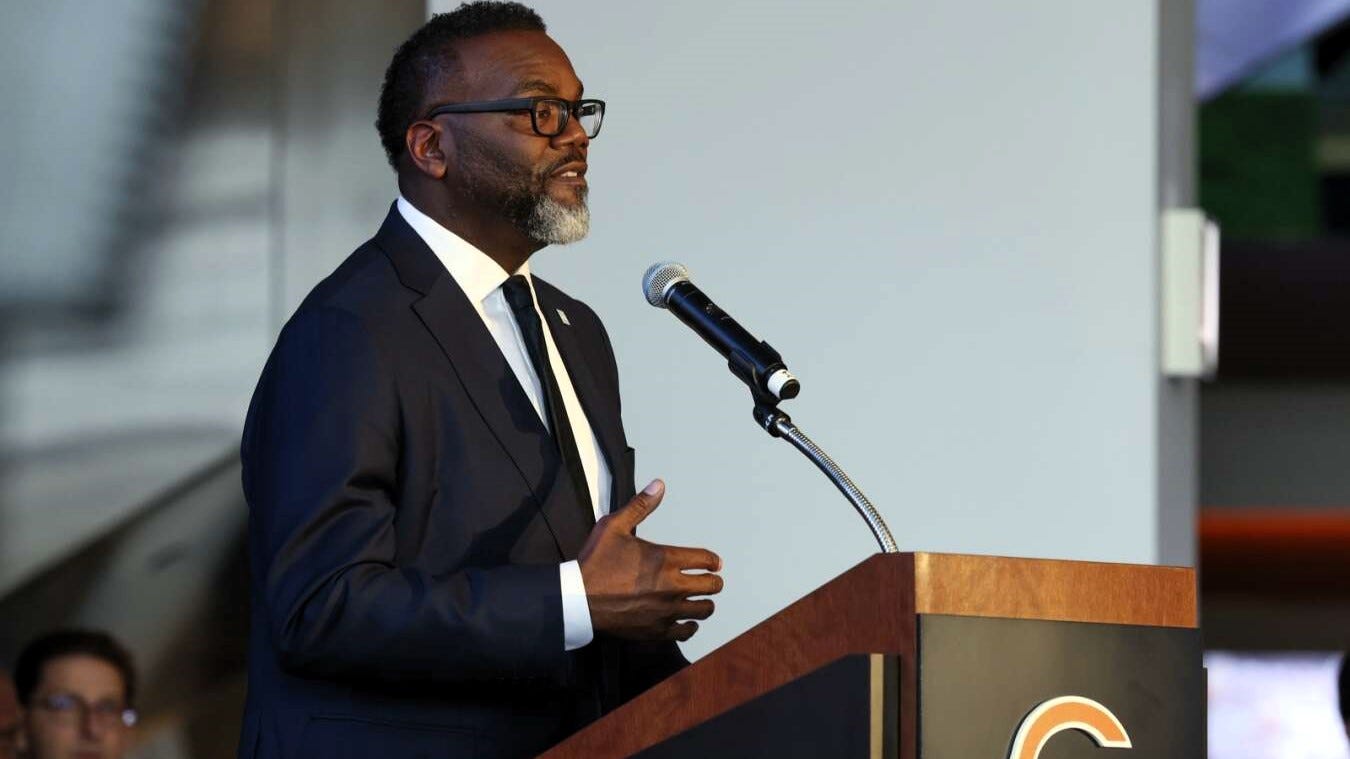THE ILLINOIZE: Monday Free for All...Are Democrats "stealing an election?"...More state employees defrauded PPP loans...Do the Bears stand any chance of Springfield success?
May 6, 2024
Good morning, Illinois.
With just three full weeks remaining in the spring legislative session, things are going start getting interesting. At least, maybe?
Keep up with all of the legislative and political news by becoming a paid subscribers. Paid subscribers get exclusive newsletters on Tuesdays, Wednesdays, and Fridays.
Click below to join us!
The House is in at 3. The Senate is back tomorrow. Governor Pritzker is at the Field Museum at 10 and speaks at the Thompson Center Redevelopment Groundbreaking at 2:30.
Let’s get to it.
YOUR MONDAY FREE FOR ALL
(note: we’re not responsible for paywalls and restrictions from other news outlets, because good journalism isn’t free)
Pritzker signs bill requiring legislative candidates to run in primaries — Republicans call it 'stealing an election' (Chicago Sun-Times)
Gov. J.B. Pritzker has quickly signed into law a measure that will eliminate the long-standing practice of allowing party leaders to choose general election candidates if no one has run for a legislative seat in the primary.
Under the new law, state House and Senate candidates must run in the primary in order to appear on the November general election ballot — but Republicans blasted Democrats for the rapid passage of what they dubbed a “dictator-style tactic of stealing an election.”
The governor signed the measure on Thursday, hours after telling reporters he didn’t know all the details.
The measure also places three nonbinding referendums on the November ballot to try to boost voter turnout after the state saw the lowest presidential primary turnout since at least 1960. And it pushes up petition filing deadlines to accommodate for an increase in early voting.
Pritzker and fellow Democrats framed it as an ethics measure that would take “backroom deals” out of the equation when choosing candidates — with Illinois Senate President Don Harmon, D-Oak Park, calling it a “favorite tactic of a former legislative leader,” Mike Madigan, who was House speaker and Democratic Party of Illinois chair.
But Republicans described the quick move as changing the rules in a game that’s already in play.
The GOP is particularly miffed at the speed of its passage — with the Democratic supermajorities in the House clearing it on Wednesday and the Senate on Thursday. The Democratic governor, who on Thursday afternoon told reporters he hadn’t seen “all the details of it,” swiftly signed the legislation hours later.
The biggest point of contention is that the new law will affect the general election this year, and Republican House and Senate candidates were already collecting petition signatures ahead of a June deadline to appear on the November ballot. The new law will give Democrats a win in races in which Republicans did not slate a candidate in the primary.
Specifically, Republicans grumbled that it will help boost state Rep. Katie Stuart, D-Edwardsville. No Republican filed to run in the district in the primary, but the GOP was in the process of slating a November candidate.
Previous law allowed local party officials to choose a candidate after a primary election as long as the prospective nominee gathered the appropriate signatures on their petitions. The new law will require legislative candidates to run in the primary in order to run in the general election.
The change does not apply to other offices up and down the ballot.
Related: Gov. J.B. Pritzker signs election bill that would favor Democrats in November (Chicago Tribune)
Democrats hand incumbents an advantage with passage of ballot access bill (Crain’s Chicago Business)
Democrats flex muscle to kick off final month of session as revenues remain on track (Capitol News Illinois)
IG says state employees made up businesses, lied about income to defraud federal COVID aid program (Chicago Tribune)
Illinois state employees fabricated hair salons, paid others to inaccurately fill out forms and drastically inflated income numbers for their side businesses in an effort to fraudulently receive pandemic-era Paycheck Protection Program loans, according to recently released reports from the Office of Executive Inspector General.
One Department of Human Services employee said on a PPP application that his car-washing business made $110,000 in a year but later acknowledged the venture had no customers or income, according to one report. Asked why he listed that amount, the report says he told investigators: “I just randomly put it in to see what I could get; I wanted to try my business again and wanted to go mobile with it.”
Another DHS employee who claimed to have six-figure income from a beauty salon business later told investigators she had only ever made $20 to $40 per month doing hair for friends and family and did not consider it a business.
The woman told investigators she “did what everyone else was doing at the time in order to get money,” the IG reports said. “She said that she did not use loan proceeds for any kind of business expenses because she does not have any business expenses.”
Those cases are two of the 275 instances in which the inspector general found PPP wrongdoing, the alleged thefts totaling more than $7 million in public funds, according to the IG’s April newsletter. Department of Human Services employees accounted for 175 of those cases. The Department of Corrections was the next highest, with 31 cases.
While the state IG provided updates on PPP investigations last year, the specifics of the alleged fraud weren’t made public until the state’s Executive Ethics Commission in recent weeks published about a dozen reports — all except one regarding Department of Human Services’ workers — detailing how they say state employees fraudulently received loans of $20,000 or more.
All employees in these cases were later fired, according to records posted by the ethics commission.
The inspector general’s office refers cases with alleged loss greater than $5,000 to the Illinois attorney general’s office for possible further action, said Neil Olson, general counsel at the OEIG. The AG can launch its own criminal investigation or pass the cases to a state’s attorney or federal prosecutors, he said.
The attorney general’s office is reviewing all of the referrals it receives and several investigations have been opened, spokesperson Jamey Dunn-Thomason said in an email.
“Attorney General (Kwame) Raoul is committed to holding accountable individuals who viewed the COVID pandemic as an opportunity for personal enrichment,” Dunn-Thomason said, while declining to comment further on pending investigations.
The AG is sure taking his time on these.
From promises of no new taxes to Burnham, Bears’ latest stadium presentation sounded familiar (Daily Herald)
As Chicago Bears executives last week presented glossy renderings and extolled the virtues of building a new stadium on the city’s lakefront, one could hear echoes of similar remarks some of those same leaders made a year-and-a-half before to a suburban audience at John Hersey High School in Arlington Heights.
While the intended location for a new Bears stadium might have been different, officials from the NFL franchise came to both events with Power Point presentations and talking points in hand, as they made pitches for public subsides to help bankroll the envisioned megaprojects.
Here is a look at some of the main similarities and differences in messaging from each presentation.
The stadium with transit-oriented entertainment district on the former site of the racetrack came with an estimated $5 billion price tag.
The stadium on Soldier Field’s south parking lot with surrounding recreation and cultural campus would be developed over three phases and cost $4.7 billion.
The Bears asked for public subsidies to make either plan happen.
In Arlington Heights, the team said it wouldn’t seek public funding for the direct stadium structure construction itself. In Chicago, they pledged $2.3 billion in private funds for a publicly owned stadium estimated to cost $3.2 billion alone.
Related: Chicago Bears’ lakefront stadium proposal: What’s been said, what we know — and what we need to know (Chicago Tribune)
Editorial: Brandon Johnson’s Bears stadium flub tells us much about his economic philosophy (Chicago Tribune)
Martire: Data does not support allotting public funds to sports stadiums (Daily Herald)
TOP STORIES LAST WEEK ON THEILLINOIZE.COM
Pritzker Signs Bill Aimed to Protect Democrat Incumbents While GOP Rushes to File Petitions
Opinion: Illinois Democrats are No Longer the Party of Free and Fair Elections
Legislators Propose Merger of Chicago-Area Mass Transit Agencies
Pritzker Administration Proposes Transferring Logan Inmates to Stateville
POLITICAL POTPOURRI
Lawmakers consider bill that would criminalize sexual relations between educators and older students (Chicago Tribune)
State awards 35 new pot-shop licenses (Crain’s Chicago Business)
Pritzker hints at Y-Block development during forum in Springfield (State Journal-Register)
Lawmakers pitch sweeping changes to energy industry and Chicagoland transit system (Capitol News Illinois)
Law enforcement community honors fallen officers at Illinois Capitol (Capitol News Illinois)
Mayor Brandon Johnson confident DNC will go smoothly despite recent demonstrations: ‘We are prepared’ (Chicago Tribune)
Editorial: Could Illinois be getting the hang of the economic development derby? (Crain’s Chicago Business)
Krishnamoorthi: It’s not too late to revive the US Postal Service (Chicago Tribune)
Opinion: Regressive? How about the state lottery? (Champaign News-Gazette)
JOIN US












